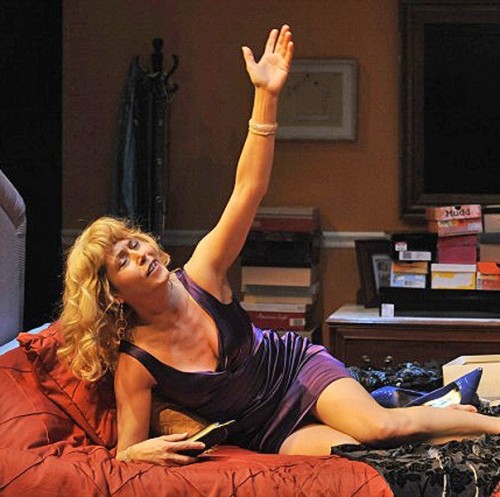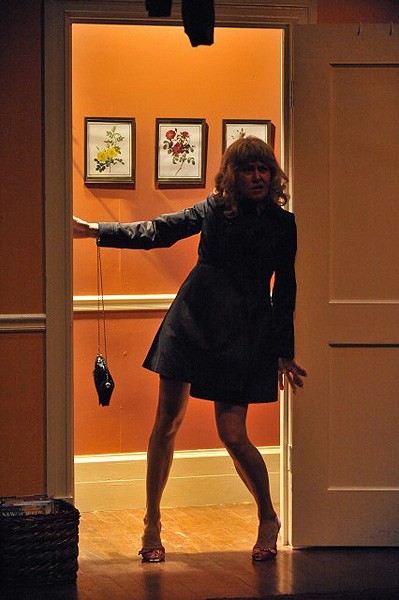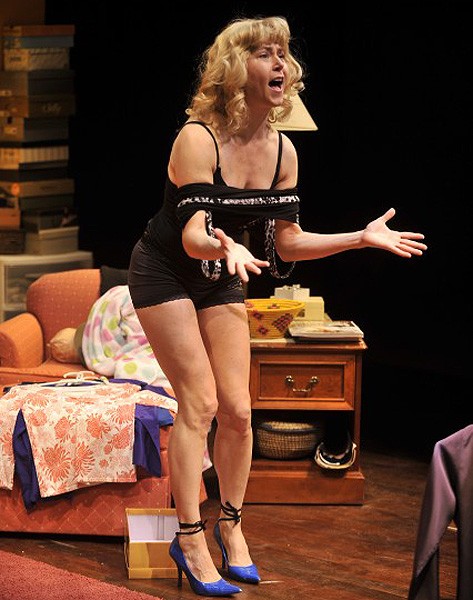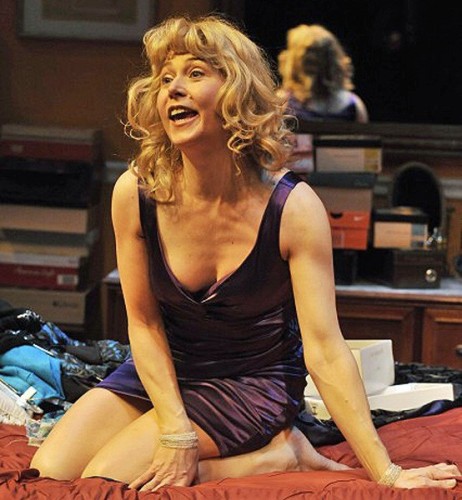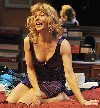Bad Dates at Shakespeare & Company, Take Two
Elizabeth Aspenlieder prepares for the role of a lifetime
By: Larry Murray - Jan 11, 2009
Actor-administrator Elizabeth Aspenlieder, and the director Adrienne Krstansky have been preparing their latest production of Theresa Rebeck's, Bad Dates . It runs through March 8 at Shakespeare & Company's Elayne P. Bernstein Theatre in Lenox. We attended a recent rehearsal, and over a leisurely coffee gabbed genially, eventually easing into the messy subject of relationships.Bad Dates is about the battle of the sexes, and how our own fantasy world is often the destroyer of relationships. Through the witty script of Rebeck we see how much dating has changed in just a few generations from a necessary prelude to marriage to the more narrow goal of simply proving we are wanted and liked.
What early dating encounter has not had its participants assume unreal identities in this search for commitment. Oddly enough, it is this very contradiction that provides the foundation for both the play's humor and its suspense. We laugh because we recognize ourselves and our self deceptions, and we agonize because, even so, it is part of who we are.
Guys are likely to think that this play, while funny, is the theatrical equivalent of a "chick flick". If they stay away, they will miss a rare opportunity to understand the feminine mystique. Instead of rolling their eyes and complaining about how they "don't understand women", this play could provide a Rosetta Stone to help unravel long unanswered questions.
Aspenlieder's character deconstructs not only her relationships and behavior, but that of her many dates as well. "By the end of the play," she noted, "my character comes to grips with the truth of it all, deciding to forgo self deception in order to have a real life, to trust in being herself." A simple truth perhaps, but how we get there is the joy ride.
The actor and director were working on a short passage in the play in which her character, Haley Walker, is preparing for a date to arrive at her apartment, but who never shows up. Watching the creative team at work it was clear that one month before opening the actor was off-book, with only a minor word correction here and there by the stage manager. Haley is clearly a bundle of nerves awaiting the date's arrival and fusses incessantly with the pillows on the chair and bed, chatting absently as she paces back and forth, nervously trying different arrangements. All the while she is revealing, bit by bit, the history of her failed dates to the audience.
Director Krstansky explains that the audience itself becomes the second character in this play, the loyal friend to whom Haley confides all her fears, doubts and insecurities, as well as hopes and dreams for a perfect evening. Watching Aspenlieder in action, we see her lose herself in the part, her inward focus so involving that she loses track of the pillows time and again, a perfect reflection of the character.
Most drama that addresses dating on television tends to whiz by in a flash, its purpose more to keep you watching between commercials than to enlighten. But a good play not only entertains, it also provokes. In watching even the brief sequence being rehearsed, I was struck with how much dating has changed over the years.
For Aspenlieder, doing a one-woman show "is a little like climbing Mount Everest. It's daunting, but doable." She talks about the process which is more than just acting. "Not only are there all the words and emotions, but there are complicated physical aspects. I am dressing or changing for one date or another, often on the run, and have to zip, hook and button everything right, or a skirt could slip off at the wrong moment. It's a lot to remember."
She has also come to a conclusion about the ultimate purpose of it all: "For men, it is the end of the quest that is important, but for women, that is just the beginning of the relationship."
Our converstation got me thinking about dates and dating, and how in centuries past it was called courtship, couples were chaperoned, marriages arranged, the young seekers rarely trusted to seek out their mates without the guidance of more mature parents and the connivance of friends.
Not too long ago, dating was done with an eye to getting married and raising 2.5 children in the suburbs with a good job that came with a pension. How times have changed.
Today many young people prefer not to date at all, considering it an anachronism, and tend to socialize in groups. Watch an early twenty-something couple getting along well and they will tell you that they are most certainly not "dating" but they are "spending time together." As the rules of dating have loosened, so has the commitment. Dating was often more about conquest for the men, while granting that wish was often a signal of serious commitment for the woman. Today it often doesn't mean anything more than a nice dinner with a few casual acquaintances.
Just as Death of a Salesman changed many people's lives, so may Bad Dates. The classic Arthur Miller play shows how delusions about one's role in life can lead to complacency and self deception, and the resultant failure to keep up can undermine everything. So it is with relationships. Reality can be painful and difficult, but in the end it is all we have.
Bad Dates is now in previews, with the official opening slated for Saturday, January 17. It will play until March 8. You should pencil it into your date book. It looks like a winner.
Quick link to Shakespeare & Company for tickets, a video blog, Bad Date stories contest, deals and packages. Tickets are also available by calling 413-637-3353.

